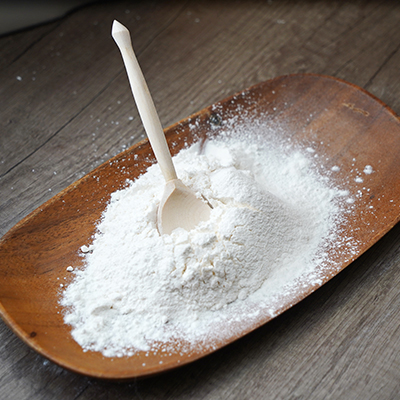Sugar Substitute
All information about "Sugar Substitute" and the related magazine articles can be found here.
Our articles are written clearly and link to scientific studies where relevant. This is how we meet our own standards: we regularly deliver new, high-quality content for you—free of charge, no sign-up required, with the highest possible benefit to you.

D-Ribose - a natural power up
From the muscles to the heart: D-ribose is of great importance for our health and performance. As a component of all human cells, it is essential for the body's energy supply and regeneration. Health-conscious people and athletes therefore rely on this natural option to support their vitality and their cells. Find out more about D-ribose here now!

How galactose works
This simple sugar works differently to glucose and therefore has special properties that make it particularly interesting for diabetics. Find out more now
Healthy alternatives for sweet treats? The variety of sugar substitutes
It is now widely known that retail sugar is not healthy [7]. In a world where the focus is increasingly on health and a conscious approach to nutrition plays a central role, alternatives to retail sugar are therefore becoming increasingly important. Sugar alternatives not only offer a way to experience sweet indulgence, but also promise a healthier alternative for people who want to reduce their sugar intake.
But with so many options available, questions arise: Which sugar alternatives are really healthy? How do they affect the body? And which sugar substitute is best suited to your individual needs? Whether you suffer from diabetes, want to change your diet or are simply looking for healthy sweeteners for tea, coffee or recipes - here you will find answers on the subject of healthy sugar substitutes.
What are sugar substitutes?
Sugar substitutes are substances that are used as an alternative to retail sugar to add sweetness to foods. These sugar alternatives are often used as sweeteners in products with reduced sugar content to reduce the calorie content and have less impact on blood sugar. These substances can be of natural or artificial origin and offer a variety of flavor profiles ranging from sweet to neutral.
Where are sweeteners found?
Sugar substitutes are used in a variety of foods, including sugar-free drinks, sweets, baked goods, chewing gum and diet products. Sugar alternatives are often listed on ingredient labels under the names of the specific sugar substitutes or with their E number. Sugar substitutes are also used in products with sweet recipes specifically for diabetics, such as sweetener, as it is well known that sugar consumption should be regulated in a diabetic diet.
Sugar alternatives: What sugar substitutes are there?
The range of sugar alternatives available is broad and includes both natural and artificial sugar substitute options. Natural sugar alternatives to retail sugar include honey, dates and ripe bananas:
Stevia: Stevia is a plant from South America whose leaves contain a natural sweetener. Stevia extract is often sold in powder or liquid form and is very sweet.
Coconut blossom sugar: Coconut blossom sugar is obtained from the nectar of the coconut palm and has a slightly caramel taste. Coconut blossom sugar has a similar number of calories to retail sugar [4].
Erythritol: Erythritol is a sugar alcohol that occurs naturally in fruit. It has a similar sweetening power to sugar, but contains almost no calories [2].
Xylitol: Xylitol is another sugar alcohol obtained from corn or birch wood. Xylitol tastes as sweet as sugar and is often used in dental chewing gum.
Sorbitol: Sorbitol is a sugar alcohol that occurs naturally in fruit.
Agave syrup: Agave syrup is obtained from the agave plant and has a sweet taste with a sweet taste with a hint of caramel. However, it has a similar number of calories to sugar.
Artificial sweeteners such as aspartame, saccharin, sucralose and neotame are also commonly used and offer a low-calorie alternative to sugar. They are synthetically produced and have a much more intense sweetening power than sugar, but there are concerns about their long-term effects on health, so further studies are needed [8].
What is the difference between sugar substitutes and sweeteners?
Sugar substitutes and sweeteners are two different types of sugar alternatives that are grouped under the term “sweeteners” and differ in their chemical properties and uses:
Sugar substitutes [1]:
Sugar substitutes are carbohydrates that are structurally similar to sugar but contain fewer calories. They are absorbed more slowly by the body and have less of an effect on blood sugar levels than retail sugar. Sugar substitutes can have a laxative effect if consumed in large quantities.
The following sugar substitutes are currently approved in the EU [1]:
- Sorbitol (E 420)
- Mannitol (E 421)
- Isomalt (E 953)
- Maltitol (E 965)
- Lactitol (E966)
- Xylitol (E967)
- Erythritol (E 968)
- Polyglycitol syrup (E 964)
Sweeteners [1]:
Sweeteners are chemical compounds that taste very sweet but generally contain no calories or only in very small amounts. They are often produced synthetically and are therefore not carbohydrates. Sweeteners are generally used in very small quantities as they have an intensely sweet effect.
The following sweeteners are currently approved as additives in the EU [1]:
- Acesulfame K (E 950)
- Aspartame (E 951)
- Cyclamate (E 952)
- Saccharin (E 954)
- Sucralose (E955)
- Thaumatin (E957)
- Neohesperidin DC (E 959)
- Steviol glycosides from stevia (E960a)
- Enzymatically produced steviol glycosides (E960c)
- Neotame (E961)
- Aspartame-acesulfame salt (E 962)
- Advantam (E 969)
The main difference between sugar substitutes and sweeteners therefore lies in their chemical structure, their calorie content and their effect on blood sugar. While sugar substitutes are carbohydrates and have a low impact on blood sugar, sweeteners are low or zero calorie and generally do not affect blood sugar levels [2].
What is the best alternative to sugar?
The best alternative for sugar depends on individual dietary needs, personal preferences and health goals. Natural sugar substitutes such as stevia and erythritol are often considered healthy options as they contain no calories and have minimal impact on blood sugar levels [2]. Artificial sweeteners offer calorie-conscious people a low-calorie alternative as a sugar substitute.
Galactose, D-mannose and D-ribose are also a healthier alternative to retail sugar. These monosaccharides are found in various foods and even in the human body and are therefore marketed as healthy sugar substitutes. You can find out more about D-ribose here.
In general, it makes sense to aim for a healthy and low-sugar diet, not only for diabetes, but also for a balanced acid-base balance. Find out more here.
Which sugar substitute tastes like sugar?
While coconut blossom sugar has a characteristic taste of its own, sugar substitutes such as erythritol and xylitol have a similar taste and sweetening power to sugar. This is why they are often used as sugar substitutes in baked goods, drinks and other foods. Sugar is also often replaced by these sugar alternatives in recipes as part of a conscious diet.
Which is better: erythritol or xylitol?
Both sugar alcohols, erythritol and xylitol, are considered good sugar alternatives. The choice between them depends on individual preferences.
Are sugar substitutes healthier than sugar?
Sugar substitutes can be part of a healthy diet, especially for people who want to reduce their sugar intake. They offer a low-calorie option and can help reduce the risk of tooth decay and blood sugar fluctuations [2].
Which sugar alternative is healthy?
When looking for a healthy sugar substitute, there is no getting around sugar alternatives such as coconut blossom sugar, stevia and the like. Natural sugar substitutes such as stevia and erythritol are considered a healthier alternative to retail sugar, as they contain hardly any calories and have less of an effect on blood sugar levels. Many people are therefore now turning to sugar substitutes to round off healthy recipes with sweeteners.
Are sweeteners harmful?
As a rule, sugar substitutes are considered safe when consumed in moderate amounts. However, if consumed in excess, they can affect the gastrointestinal tract and have a laxative effect [5]. However, if the symptoms persist for a longer period of time, they could also have other causes. You can find out more about irritable bowel syndrome here.
Some studies have indicated that excessive consumption of certain artificial sweeteners may be associated with negative health effects, which is why they are only permitted with a maximum daily intake [2]. Further research is also needed into how sweeteners can affect the health of children and pregnant women. The WHO also classifies aspartame as a possible carcinogen [2].
Xylitol is dangerous for dogs [9]. Even small amounts can be toxic and lead to life-threatening complications.
What is the best sugar substitute for diabetics?
Natural sugar substitutes such as xylitol and erythritol can be a possible choice for diabetes, as they only have a minimal effect on blood sugar levels [6]. A study shows that, contrary to popular belief, some sweeteners can affect blood sugar levels. Aspartame, saccharin, sucralose and stevia were tested and found to increase the risk of obesity and type 2 diabetes and appear unsuitable as sugar substitutes for diabetics [3].
The advantages and disadvantages of sugar substitutes?
The use of sugar substitutes has advantages and disadvantages. The advantages include reduced calorie intake, reduced risk of tooth decay and better blood sugar control. Diabetics can benefit from sugar substitutes as they can use alternative sweeteners to reduce the consumption of high glycemic foods. However, these should only be used in moderation. This can help prevent complications associated with diabetes and improve overall wellbeing.
Disadvantages of sweeteners can include stomach discomfort, a laxative effect if consumed in excess and a possible association with increased cravings for sweet foods. It is important to take a balanced approach to the use of sugar substitutes and not rely on them exclusively if the goal is to ensure a healthy diet.
Sources
[1] https://www.lebensmittelklarheit.de/informationen/suesse-zusatzstoffe-zuckeraustauschstoffe-und-suessstoffe
[2] https://www.verbraucherzentrale.de/wissen/lebensmittel/kennzeichnung-und-inhaltsstoffe/suessungsmittel-was-sind-suessstoffe-und-zuckeraustauschstoffe-81624
[3] https://www.diabetiker-nds.de/news/meldung/news/suessstoffe-veraendern-darmflora-und-erhoehen-teilweise-blutzucker
[4] https://www.verbraucherzentrale.de/wissen/lebensmittel/schlankheitsmittel-und-diaeten/kokosblueten-birkenzucker-stevia-co-alternative-suessmacher-im-trend-13370
[5] https://www.apotheken-umschau.de/gesund-bleiben/ernaehrung/wie-gesund-ist-zuckerersatz-893751.html#:~:text=Zu%20viel%20Zuckeraustauschstoff%20wirkt%20abf%C3%BChrend,%E2%80%9C
[6] https://www.aok.de/pk/magazin/ernaehrung/gesunde-ernaehrung/suessigkeiten-fuer-diabetiker-wie-sie-bewusst-naschen/#:~:text=Eine%20Alternative%20sind%20Produkte%20mit,keine%20Auswirkungen%20auf%20den%20Blutzuckerspiegel.
[7] https://www.medizin.uni-tuebingen.de/de/das-klinikum/pressemeldungen/450?press_str=
[8] https://www.cancer.gov/about-cancer/causes-prevention/risk/diet/artificial-sweeteners-fact-sheet
[9] https://laboklin.de/de/intoxikationen-bei-hunden-und-katzen-haeufigste-ursachen-und-hinweise-zu-praevention-therapie-diagnostik/
